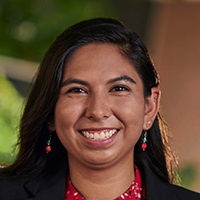
Chloe Elm
From land rights issues to the preservation of the basic family unit, Indigenous law presents unique challenges.Chloe Elm seeks to be a change-maker for tribal nations and Indigenous people by building a career with the government through which she can invoke change and create better policies.
Elm came to MSU Law to study at the Indigenous Law and Policy Center, one of few programs of its kind in the nation. She hails from Syracuse University where she studied forensic science and psychology with minors in medical anthropology and Native studies. Her decision to go to law school was inspired by her knowledge of how the law impacts everyone’s lives.
“The law has affected my ancestors and continues to affect me,” Elm said. “The law dictates the taking of tribal land. It dictates the rights and commodities Indigenous people are entitled to, and it dictates what makes someone Indigenous with something as trivial as blood quantum.
“The whole concept of Indigenous identity as recognized by the government is in the hands of the law and those who make it. That’s why it is important to have Indigenous people familiar with the law and how it works so we can fix the errors of the past and pave a way to a better future.”
As a 2L law student, she’s spreading awareness about the issues faced by Indigenous communities, like human trafficking. She planned an event for the Native American Law Students Association and ATLAS to inform the MSU Law community.
“While I was not particularly familiar with planning an event such as this, I managed to get a speaker, provide food, and advertise the event with the help of my friends. I’m particularly proud of this because it is an issue close to my heart,” Elm said. “Over 75 people showed up, which helped assure me that other people are willing to listen and care. It was also a good educational moment for those who weren’t familiar with Indigenous issues as well.”
Elm has met people at MSU Law who inspire, challenge, and motivate her, especially when it comes to preparing to reach her goal of working with the federal government on behalf of Indigenous nations.
“Having more experience with the government and how it works with Indigenous communities, specifically in the legislative or judicial branch, is valuable because the relationship between the government and Indigenous tribes is complex and confusing. Decisions made by those branches affect every Indigenous tribe, and Indigenous communities suffer when people who don’t understand the issues are the ones making decisions,” she said.
“Representation is important if you want real positive change to happen. Here at MSU, learning and working with people who are supportive and are truly experts in Indigenous law has helped me stay focused and has set me on the right path toward what I want to pursue for a career.”

